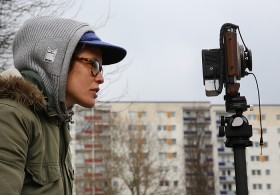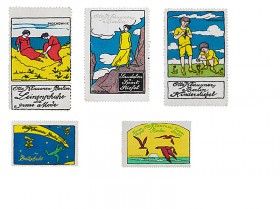
Hadas Tapouchi © Katja Täubert
History cannot be captured in a single form. Not in brass, not in metal. That is what Hadas Tapouchi says. The Berlin-based Israeli artist believes that monuments and inscriptions miss the actual sense of commemoration. This type of remembrance would be an inevitable path towards forgetting.
Undoubtedly, Hadas works against forgetting. Upon our first meeting at her Tel Aviv apartment about four years ago, the artist’s rendered self-portrait in prisoner’s garb immediately jumped out at me. It was one of the precursors to her project, “The Third Generation“. A countless number of portraits since followed – portraits of mutual friends, the author himself, as well as young men and women between Berlin, Tel Aviv and Ramallah. → continue reading

Five stamp-sized advertisements for the company Otto Klausner GmbH, Berlin, ca. 1910-1914. Gift of Peter-Hannes Lehmann
Like every museum, we have some objects in our collection that are always on display for our visitors, some that we show from time to time in temporary exhibitions, and also some that we rarely show because they are more suited to research purposes. And then there are objects that we should have put on view long ago but they are still sitting, out of sight, in our warehouse. It affords a particular pleasure when such items finally get processed for our online database and put on display.
A collection that falls into this category is a set of graphics by Leo Prochownik (1875 – 1936) → continue reading
The last few weeks have been full of hectic hustle and bustle, with boxes being passed from hand to hand, examined, unpacked, and sorted through. Such a variety of objects emerged from their cases and seemed to be disseminating in every direction through the museum.

© Jewish Museum Berlin, photo: Gelia Eisert
Blue prints were spread out over a long, dark red sheet. Words seemed to glow in them – was it “tekhelet” or “argaman” or both? And what do they mean anyway?

© Jewish Museum Berlin, photo: Gelia Eisert
A “magic” card appeared in a kitchenette. Suddenly everything was kosher: the sink, the refrigerator, the dishes, the whole kitchen. The artist promised it would be, and thus it happened. → continue reading



